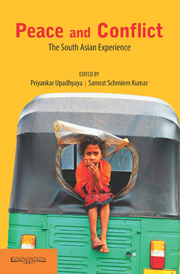Book contents
- Frontmatter
- Contents
- Foreword
- Preface
- Introduction
- 1 Conflict Resolution and Peacebuilding: Ideas, Approaches and Debates
- 2 Changing Perspectives on Peace Studies in South Asia
- 3 Peace Pedagogies in South Asia: Interreligious Understanding
- 4 Responses of Communities to Social Tension
- 5 Plurality of Peace, Non-violence and Peace Works in India
- 6 Education and Culture of Peace: Engaging with Gandhi
- 7 Structural Violence and Human Security: Gandhi's Visions
- 8 Women and the Peace Process in Nepal
- 9 Quest for Peace and Justice in Pakistan: Lawyers' Non-violent Resistance
- 10 Antinomies of Democracy and Peace in Nepal
- 11 Post-armed Conflict Trajectories in Sri Lanka
- 12 Environmental Security and Conflict in Bangladesh: Nature, Complexities and Policies
- Contributors
- Bibliography
- Index
3 - Peace Pedagogies in South Asia: Interreligious Understanding
Published online by Cambridge University Press: 05 October 2014
- Frontmatter
- Contents
- Foreword
- Preface
- Introduction
- 1 Conflict Resolution and Peacebuilding: Ideas, Approaches and Debates
- 2 Changing Perspectives on Peace Studies in South Asia
- 3 Peace Pedagogies in South Asia: Interreligious Understanding
- 4 Responses of Communities to Social Tension
- 5 Plurality of Peace, Non-violence and Peace Works in India
- 6 Education and Culture of Peace: Engaging with Gandhi
- 7 Structural Violence and Human Security: Gandhi's Visions
- 8 Women and the Peace Process in Nepal
- 9 Quest for Peace and Justice in Pakistan: Lawyers' Non-violent Resistance
- 10 Antinomies of Democracy and Peace in Nepal
- 11 Post-armed Conflict Trajectories in Sri Lanka
- 12 Environmental Security and Conflict in Bangladesh: Nature, Complexities and Policies
- Contributors
- Bibliography
- Index
Summary
Introduction
While religious differences are readily seen as a cause or pretext for violence, we are yet to recognize religion as a potent force in peaceful resolution of conflicts. The peace and conflict resolution studies have lately shown greater inclination to do so. The growing recognition of religion and faith-based actors in peacework has been a much-needed course correction. Not long ago, scholars regarded religion either as an instigator of conflict or ignored it altogether. The positivist and secular sway would not like to admit religion-based ideas and actors within conflict resolution framework (Bercovitch and Orellana 2009).
Undoubtedly, the religious communities have a pervasive appeal. They are trusted institutions with vast human resource network, which could readily inspire peace and understanding within and across their communities. They can provide social cohesion and spiritual support to alleviate the pain and suffering ushering in forgiveness and reconciliation. Thus, if religion plays a part in conflict, it may also become a part of its resolution. No wonder the pedagogies of religious pluralism and spirituality are now assuming greater attention in peace studies discourses (Kazanjian and Laurence 2000, Lin and Brantmeier 2010).
While the post-9/11 transferences marked a surge of violence motivated by religious claims, it also witnessed a corresponding increase in peace work inspired by the religious actors. Increasing number of religious communities are able to harness their resources for building peace, often challenging structures of direct and indirect violence. In many instances, religious actors have engaged in mediation and trauma healing and providing valuable humanitarian and relief services in war-torn areas (Abu Nimer and Orellana 2005). New and creative forms of interfaith dialogue are being practised to promote communal peacebuilding (USIP 2000, Smock 2002).
- Type
- Chapter
- Information
- Peace and ConflictThe South Asian Experience, pp. 44 - 62Publisher: Foundation BooksPrint publication year: 2014

